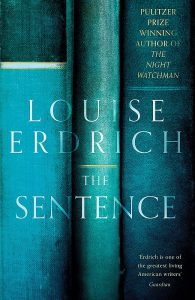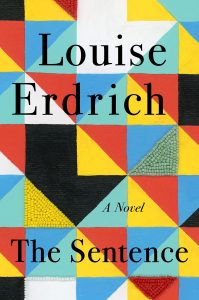 Published by Corsair UK/ Harper US
Published by Corsair UK/ Harper US
January 2022/November 2021
400pp, hardback, £20/$28.99
Reviewed by Elsbeth Lindner
The Sentence may not yet be Louise Erdrich’s most celebrated work – her backlist includes Pulitzer Prize and National Book Award winners – nevertheless this latest novel is an immersive, impactful, politically astute, love-drenched, subtle, often comic work which touches deftly on many important issues, from books and Indigenous lives, to death and hauntings.
Death indeed enfolds the story which opens with central character Tookie’s fateful choice to help a friend dispose of a corpse. This act leads swiftly to her arrest, trial and incarceration for a decade, but also, subsequently, to her rebirth as a bookshop worker devoted to literature and to a relationship with Pollux, the Native policeman who arrested her.
Later, the reader may feel this semi-prologue , with its focus on prison and despair, doesn’t seem quite in step with the rest of the novel, the larger part of which is devoted to Tookie’s community of workers, customers and family in Minneapolis. (Erdrich herself owns Birchbark Books, an independent bookstore in that city, and this is where Tookie works, with Erdrich making modest appearances.) The novel’s proper heart and tone emerge here, in a broad, inviting portrait of Native American lives at work and play, and later grappling with Covid and the murder of George Floyd. The melodramatic opening may introduce appropriate themes but could conceivably belong to a more insistently nightmarish tale.
Nightmares do occur later in The Sentence, notably in what it reveals of racism’s long and continuing history and the abuse of minorities, but the prevailing tone is snappy and upbeat. At the plot’s forefront is Flora, a customer of the bookstore who dies but then returns to haunt the shop generally and Tookie in particular. Flora’s undead state connects to questions about the co-existence between racial groups and also the deathless continuity of wrongdoing, and remembering. Glimpses of historical artifacts and personal anecdotes elsewhere also inject horrific glimpses of the past which bleed directly into the relationship between Tookie and Flora.
Tookie, neither small nor pretty – ‘I am an ugly woman,’ she tells us – is a fine mouthpiece for this story of history, legacy, determination and unsubdued spirit. Her relationship with Pollux offers a steady drumbeat of positivity and mutuality, and their domesticity adds a further, fruitful dimension, with its recipes and commentary on wild rice, soup, fry bread and more. Behind it lies another span of Native history, ranging from agriculture and geography to contemporary battles over pipelines.
Erdrich’s ease, wit and literary experience are on fine display in her generous, multi-layered tale, threaded with injustice and passion. The larger issues will not be resolved, but the personal dramas experienced by Tookie – with Flora, with Pollux, and with her complicated stepdaughter – reach solid and rightful conclusions. And then there’s a bonus final section to the book, in the form of Tookie’s literary recommendations. And what a knowledgeable reader she has become, her sub-headings including Perfect Short Novels (including work by Penelope Fitzgerald and Jean Rhys), Indigenous History, Non-Fiction and Poetry, and Sublime Books.
Add all this to the charm of its voice, the relevance of its content and the embracing warmth of its love story, and you have a big-hearted book by a national treasure.
